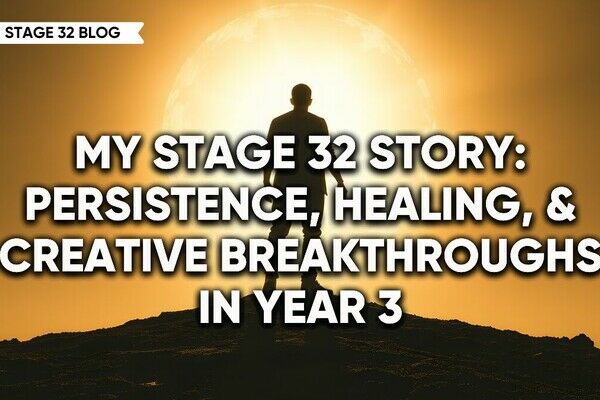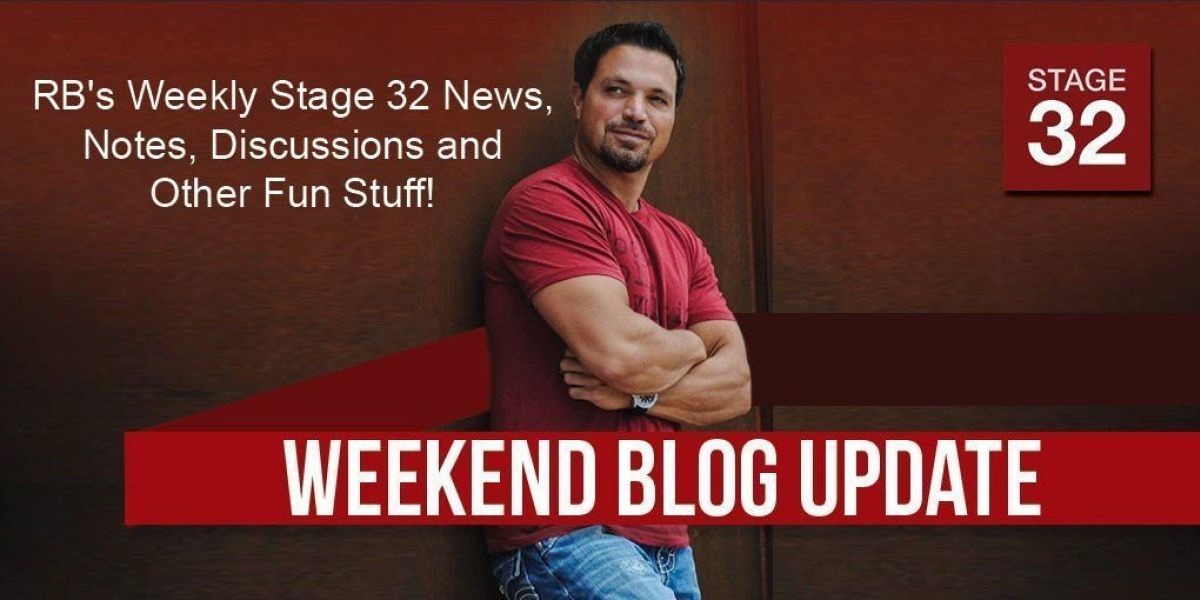Top 10 Beginner Mistakes Made at Music Studios
 Richard "RB" Botto
Richard "RB" Botto In this blog, we asked them to compile a list of the top 10 mistakes they see people make during their first job at a music studio. From giving out your demo, to serving cold coffee, to bad mouthing the composer while accidentally sitting on a microphone so the whole studio can hear you (yikes!), these are all real life examples of beginner mistakes that Sam and Mike have witnessed. While their topic is focused primarily on music studios, the advice is great for film sets, writers rooms, and any other professional situaiton you find yourself in.
I thank Sam and Mike for their contribution to the Stage 32 blog.
Enjoy!
RB
That experience helped me land my next home, which was Remote Control Productions (Hans Zimmer) as the Sample Department Manager. At RCP, I expanded the department and lead his team in designing sounds for movies such as Angels and Demons, Sherlock Holmes (1 & 2), Rango, Pirates of the Caribbean IV, Inception, Dark Knight Rises, and video games such as Crysis 2, Modern Warfare 2, and many more.

While at RCP, I met Michael Hobe. Michael’s journey into the industry started from Loyola Marymount University where he majored in – believe it or not - International Business and Management. He knew his heart was in music; so he went on to pursue a career doing just that. He earned a degree in audio engineering from the Musicians’ Institute in Los Angeles and joined Remote Control Productions. Michael specialized in sample development and our working camaraderie sparked at RCP. He worked on numerous movies, including The Dark Knight, Sherlock Holmes (1 & 2), Inception, Rango, Pirates of the Caribbean IV, and The Dark Knight Rises. Even if you might feel your path is going one way, Michael is proof that you should follow your passion to do what you love.
Working side by side we both recognize that you have to have an appreciation for the craft, the business, the art and all things media in order to help your journey. We have logged years of work in major music composition studios, working along side major directors, music editors, composers, and studio technicians. We have also been a part of the training process of interns and students, giving them tools to grow into the professional studio environment. In that regard, there are several common mistakes of inexperienced hires that we have noticed that we would like to share with you all in hopes of helping you to avoid them. All of these, except for #10, we have seen people get fired for - we don't want that to happen to you. These are guidelines from our experiences to help you make the best impression in the studio that you can and cultivate an awesome career for yourself.

1. Never give your music demo unless asked for!
Demos are a tricky thing. Everyone has a demo, and giving your demo to people, when not asked for, is a big “no-no”. For starters, you may be giving your demo to a director, who may not be looking for music yet, but listens to your music, and if it’s not the right fit, already has said no without giving you the chance to “try” the right piece of music.
Second, if you give your demo to a composer, last thing they want to listen to is more music, and more importantly there are legal issues. Most composers will never accept a demo. “Joe” established-composer is given a demo from a new-composer “Bob”. Let’s say Bob had written a track inspired by the music of Joe on the demo. Joe never listened to Bob’s demo, but Joe happened to be writing a cue for Joe’s upcoming film. Bob hears Joe’s new score, and thinks that the music that was on their demo, was copied by Joe. Bob sends a legal letter to Joe claiming that Joe copied Bob’s demo track - even though Bob’s demo track was inspired by Joe to begin with.
A composer will ask you for a demo when they have gotten to know you, has had a chance to work with you a bit, and wants to hear another style that you may be able to do better.
2. Never touch the instruments or gear.
You’d be surprised how often this happens in a studio. As we are all musicians, we always like to touch and play instruments. Let’s say Bob walked into a guitar composer’s studio, and picked up what looked like a cheap, harmless instrument, started playing it, only to have the owner of the instrument walk in and look at someone playing their $10,000 baby that has gotten them through hundreds of scores. Or let’s say Bob walks into a recording studio. Sees a bunch of red lights on a digital console (audio clip notifications), decides to show off their knowledge and “clears” the console, which accidentally erases all the of the session data on the console.
However, once you get to know the studio owner, always ask if you want to play/touch something - worst thing they can say is “no.” Always put yourself in their position: would you really want someone touching your gear?
3. Bad cups of Coffee/Tea.
As silly as this sounds, coffee is the life-blood of any studio. A studio employee (Engineer, Musician, Composer, etc) has been working for over 24 hours straight. They only have 10-15 seconds to run over to the coffee machine to get refueled, only to find that you failed in your job to make sure the coffee wasn’t cold, undrinkable, and stale. Tired people = cranky people. The last impression you want to make is to have a cranky person mad at you.
4. Dirty Dishes.
It’s all in the details - missing plates, dirty dishes, unclean studio, etc. Any task you are given at a studio, do it to the best of your ability. You are constantly being watched and judged, and if you can’t do the smallest of details in making sure a studio is presentable, why would a studio owner give you any bigger responsibilities? This shows how professional you are, and how you work and operate in a professional environment.
5. You have no opinion.
You have NO opinion. There are many times we have seen people walk into a studio, and just start talking or responding, either to show off their knowledge, feel important, or just to be the center of attention. This is a huge no-no. Sometimes you may be entering into a conversation that is of high security, or you may be talking to people who are experts in the field, or other very powerful people - and often your input is either invalid, a derailment of the conversation, or just simply wrong.
However, if you are asked an opinion, you need to use your own judgement to either say, “I am not qualified to answer that” or actually give your opinion. Some people need “yes” people, some people need a “vibe” in the room, some people need honest people. You need to develop relationships with individuals first - after a while with anyone, you will know what you need to say.
6. Overpromising and under-delivering.
There is always this thought that you should say YES to everything. When a studio is on tight deadline and needs a specific item/task handled which is critical to the process, the last thing you want to have happen is to say “yes” without knowing how to do it, or at least realizing your limitations. A studio needs to delegate tasks, because ultimately the studio is responsible for a project failure (it's never a failure of an employee). A studio will lose more respect for you when you tell them “yes” and fail, then say, “No, that’s really not my area of expertise, please let me know if I can help as I would love to learn for the next time.” At this point the studio may still let you do it, not have the expectation of a completion, and this can give you the opportunity to show eagerness and the willingness to learn.
7. Non-Disclosure Agreement (NDA) and Social Media.
Every studio employee must sign a Non-disclosure Agreement (NDA). This is the most important part of any project. We all like to brag, or let friends or family know of our work, but the reality is a lot of these projects (even the smallest ones) need security. It’s a violation of trust to talk about any project before it is announced or released. Best rule of thumb is stay silent about everything you are working on, until it is released or announced by the studio. The best thing to say is, “I’d love to tell you about it, but I can’t until it’s released, but you will love it!” Intrigue is often more valuable than bragging rights.
Social media and the NDA is even worse - most violations are rather innocuous. It’s usually when you have a screen in the background showing the “picture” and even a cue title. Let’s say you want to take a picture of your rig of how many tracks you just wrote, or your cat on your keyboard, and if you have not blurred out the important bits - you are in violation of the NDA, and can lose the gig.
8. Gossip in the Studio.
Within the studio this can kill your career, as you are usually in a place full of microphones! We have seen a composer’s assistant go into a recording room to talk to a musician and start bad-mouthing the music only to have the microphones live in the control booth where both the composer and director are listening to the entire conversation. It’s an excellent rule of thumb: if you can’t say something nice, don’t say anything at all. You never know people’s alliances, biases, or even friends of friends.
9. You never know who you are talking to.
Along with gossip, you never know what scruffy looking, unkempt individual might be standing in front of you. They could be a major musician, director, composer or even your boss (that you never met). Always watch your actions and speech, you will never know every director, composer, their sons or daughters, or even the power of a mid-level employee on a hiring decision. Always treat everyone in a professional and respectful manner - it makes you look good as well as the studio as a whole.
10. Seize every opportunity!
If someone asks you to take notes, run an errand, wrap cables, or even just to sit on the couch and learn, do it - especially if you say you are going to do it! Successful people say they were in the right place at the right time. Well, it’s hard to be in the right place if you are never there to begin with. Sometimes this takes initiative too; you’d be surprised by the generosity of a lot of individuals in this industry. We all started someplace very low, and know how hard it is to break in, and then how much harder it is to stay working. Just a simple, “Do you have time for me to sit in and watch?” It’s not pushy, it shows interest and respect. This is how you get to know people, let them ask you questions and LEARN!
We hope our experience and advice are helpful, not only to composers, musicians, sound designers and editors, but also to other crafts. Use these tips when you're in a writing room, or an editing bay. The lessons are universal for all creatives -- we are all in this together!
Sam and Mike will be teaching Music Composers 101: Breaking In and Staying In this coming Thursday, 1/29/2015 at 1pm PST. To read more about the webinar, click here: Music Composers 101: Breaking In and Staying In
Like this blog post? Please share it on social media (Facebook, Twitter, LinkedIn, email etc) by using our social media buttons at the top of the blog. Or post to your personal blog and anywhere else you feel appropriate. Thank you.
As always, Sam and Mike are available for remarks and questions in the Comments section below!
| Improve Your Skills and Perfect Your Craft |
| RB's Stage 32 News, Notes, Discussions and Other Fun Stuff (January 23, 2015) |
Search Stage 32 Blog
There are now 4038 blog posts for you to enjoy. Search them all by tags below.
Acting, Advice, Cinematography, Coffee & Content, Composing, Contests, Distribution, Featured, Filmmaking, Financing, Inspirational, Networking, Producing, Screenwriting, Success Stories, Tips, Trending,Relevant Tags
Recommended Articles

Find Your Footing on Stage 32: Join Our December Community Open House

Stage 32 + DramaBox Join Forces to Launch World's First Vertical Drama Incubator

Green Lights and Grey Areas: Expanding Creative Collaboration in Publishing

How Stage 32 Script Services Make You A Better Writer

Coffee & Content: Why Your Pitch Needs to Be Human

Stage 32 Certification Featured In IndieWire!

Insider Intel: 2026 Predictions

My Stage 32 Story: Persistence, Healing, & Creative Breakthroughs in Year 3

What Stage 32's Community Is Really About (Beyond Scripts, Sets, and Showreels)






